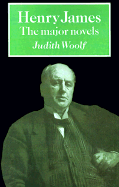Book contents
- Frontmatter
- Contents
- Acknowledgements
- A brief life of Henry James
- Bibliographical note
- 1 Introduction
- 2 The Europeans, Washington Square, Daisy Miller
- 3 The Portrait of a Lady
- 4 The Bostonians
- 5 What Maisie Knew
- 6 The Awkward Age, The Ambassadors
- 7 The Wings of the Dove
- 8 The Golden Bowl
- 9 Afterword
- Select bibliography
3 - The Portrait of a Lady
Published online by Cambridge University Press: 01 June 2011
- Frontmatter
- Contents
- Acknowledgements
- A brief life of Henry James
- Bibliographical note
- 1 Introduction
- 2 The Europeans, Washington Square, Daisy Miller
- 3 The Portrait of a Lady
- 4 The Bostonians
- 5 What Maisie Knew
- 6 The Awkward Age, The Ambassadors
- 7 The Wings of the Dove
- 8 The Golden Bowl
- 9 Afterword
- Select bibliography
Summary
F. R. Leavis in The Great Tradition reprints James's ‘Daniel Deronda: A Conversation’, a perceptive and witty critical piece in which three different readers discuss George Eliot's novel, expressing three different opinions of it, all of them valid. Theodora, who is modelled on, and named after, the Dorothea of Middlemarch, takes the high-mindedly approving line that Dorothea herself might have taken if she had had the opportunity to read Eliot's novel; Pulcheria, frivolous but sharp-minded, focuses on the book's defects; while Constantius takes a judicial middle view, which James is careful to prevent the reader from assuming too easily to be his own. Leavis advances the ‘Conversation’ as proof of the influence of Eliot's Gwendolen Harleth on James's Isabel Archer, drawing particular attention to Theodora's description of Gwendolen as
a perfect picture of youthfulness – its eagerness, its presumption, its preoccupation with itself, its vanity and silliness, its sense of its own absoluteness. But she is extremely intelligent and clever, and therefore tragedy can have a hold on her
which he tricks the reader into taking for a moment to be a description of ‘some girl encountered in actual life’ whom James had in mind when creating Isabel. I think that Leavis was undoubtedly right about the influence of Gwendolen on Isabel, but that influence operated in a more subtle way than his analysis of her as ‘Gwendolen Harleth seen by a man’ would suggest.
- Type
- Chapter
- Information
- Henry JamesThe Major Novels, pp. 35 - 58Publisher: Cambridge University PressPrint publication year: 1991



